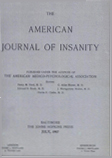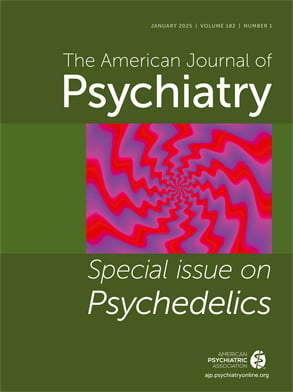Abstract
I. This study brings out the rarity with which traumatic psychoses occur, as our series covered a period of 16 years and avenged only one-half of one per cent of first admissions to the hospital.
II. In comparison with the severity of the psychosis shown, the duration of stay in the hospital and subsequent adjustment, both social and economic, is better than might be expected, with the exception of the cases of post-traumatic mental deterioration, which usually require continued hospital care.
III. The factor of over-indulgence in alcohol has a definite relation both to the causation of the accident and to the adjustment of such patients after leaving the hospital. The adaptation is consistently on a lower level than in the cases in which alcohol is not used excessively.
IV. The occupational limitation of our patients to the classes of tradespeople and laborers may somewhat nullify the optimistic outlook as to social and economic readjustment, for naturally their rehabilitation is not on a high plane. The one case of a professional person showed that he was unable to resume his law practice and former social activities. It is very possible that head trauma may have a more disastrous effect on those who have formerly engaged in professions or more intellectual and specialized occupations than on those whose economic life has been more one of routine and manual labor. The realization, however, that the greater part of our population is made up of tradespeople and laborers justifies the expectation that a reasonably satisfactory recovery from a traumatic psychosis will be made in the majority of cases.
V. The type of injury sustained seems to play an important part in the adjustment of the patient to his former surroundings. The cases of fracture of the skull are less apt to readjust socially than the ones with head injury without fracture and are markedly less able to resume their former occupations than the latter. This should be an important consideration in prognosis.
VI. The most common of the sequelæ of traumatic psychoses appear to be: continued irritability; headache; dizziness; and, to a lesser extent, irresponsibility, with impaired judgment. In the deteriorative forms, we find immaturity and disturbances of the intellectual faculties.
VII. While it is true that the traumatic psychoses, in proportion to the other psychoses, are relatively rare, much can be done for them in the nature of prevention by modern methods of treatment that have been so well set forth in the new literature on the subject.
VIII. It would seem that but a small proportion of head injuries develop psychoses. It is well-known, however, that they do not escape entirely from mental or nervous defects and that a huge number constantly develop the neuroses, which ordinarily remain as neuroses and do not develop into psychoses.

